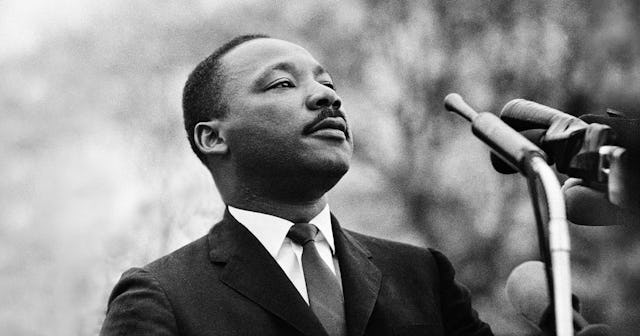Don't Post An MLK Quote On Social Media Unless You're Truly Anti-Racist

Every year around this time — when many get a long weekend off work and school because of Dr. Martin Luther King, Jr. Day — my social media feed is flooded with quotes. I’ve noticed that the same few words are shared on repeat by white people—and they are not the ones that speak of the evils of racism. Instead, they are warm-and-fuzzy quotes, often pulled out of context, presenting as generalized and neutral.
Perhaps you’ve seen them, too? “I have decided to stick with love. Hate is too great a burden to bear.” “We must accept finite disappointment, but never lose infinite hope.” “If you can’t fly, then run; if you can’t run, then walk; if you can’t walk, then crawl, but whatever you do you have to keep moving forward.”
Each watered-down post is meant to convey “look-how-progressive-I-am” or to alleviate a bit of white-guilt.
They aren’t fooling me, a white mom of four black children. Our multiracial family has experienced racism and its byproducts—stereotypes and microaggressions. Multiple strangers have touched my black daughters’ cornrows in the name of curiosity. My son has been called a “cute little thug.” My girls were called the n-word by a young, white male while they were riding bikes in our driveway.
I’ve been asked if my kids were born drug addicted. Strangers have approached us to ask my kids if they enjoy playing basketball—not knowing if they play any sports at all. Teachers and coaches have botched my kids’ names—and mixed them up with other black kids—well past the beginning of the school year.
Racism is pervasive and ever-present. It is systemic—in work places, in educational institutions, in politics, and in courtrooms. Racism isn’t limited to something horrible that happened on southern plantations and during Jim Crow. Racial violence is today’s reality too. Some racism is blatant, while some is more discreet. But no matter how racism presents itself, all of it is harmful.
The only people who are buying into the fleeting and faux-woke MLK quote nonsense are those who are also blissfully ignorant. Every time I see a post, it feels like a slap in the face. Picking and choosing the Dr. King we present on our timelines is a hallmark of white privilege. So is the attempt to reduce Dr. King to a few words instead of the acknowledging the road he paved for others.
I’m totally down with celebrating Dr. King — if it comes with his raw truth-sharing. What I’m not here for is the person who posts a white-favored MLK quote one day each year, while not posting a single pro-black story, quote, or video from February through December. Those who clap back at police brutality with a reference to black-on-black crime, or insist that everyone who lives in this country needs to know how to speak English, do not deserve the honor of sharing King’s words.
Would quote-posters protest alongside King if he were alive today, showing up as white allies? Will they be using their right to vote to elect people of color into positions of leadership? Are they talking to their employers about ditching discriminatory hair policies? How many school PTA meetings have they attended, advocating for black history to be taught outside of just February? Did they call out their uncle who told a racist joke at the holiday dinner table?
Are white parents purchasing dolls, action figures, and books featuring children of all shades—or better yet, starring black people? What movies do they go see? How racially diverse is their neighborhood? Or, are they solely relying on one “I Have a Dream” school art project to educate their children on race? Parents set the tone for their children — and I question, what’s being taught? Ignoring race is a lesson–teaching children that race discussions are taboo and inappropriate.
What real activism is being done? Sharing a quote on social media is casual—and it’s insulting when it stands solo. There is a big difference between being not-for-racism and being anti-racist. Non-racist isn’t a thing, anyway. Just like colorblindness, the race card, and reverse racism aren’t real, either.
https://www.instagram.com/p/B2E5-L3HkWf/?utm_source=ig_web_copy_link
The Dr. King I’ve learned about, and am still learning about, believed in radical change and self-sacrifice. He did the work and died doing it. He embodied what he claimed—that “our lives begin to end the day we become silent about things that matter.” There’s a lot of silence, and not nearly enough white-ally, anti-racist work.
White people, we need to call out racism instead of calling forth peace, unity, good vibes, and positivity. We can’t live our best lives—using MLK as a once-a-year accessory—while plugging our ears when our black and brown friends, co-workers, and neighbors tell us their truths. Doing so makes us hypocrites—and dangerous. If we aren’t helping solve the problem, we’re contributing to it.
If you truly want to be anti-racist, good. But please don’t limit yourself to acknowledging Dr. King during a single weekend in January. Including a peace-and-love quote in your social media feed among a cute cat video and a picture of your kid at basketball practice is cowardly. True anti-racism work means listening to people of color, learning from them, and standing up for them and alongside them—all year round.
This article was originally published on